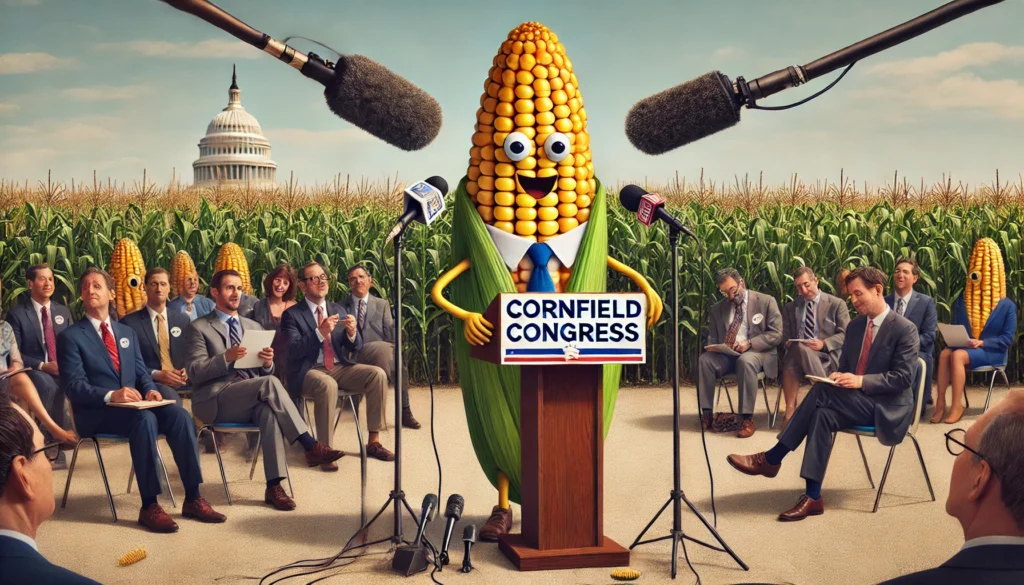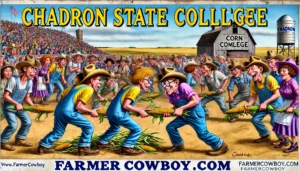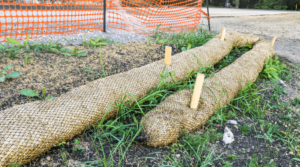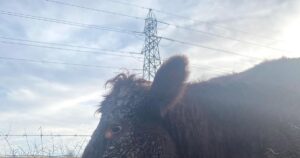
FarmerCowboy.com A humorous satirical image of a cornfield holding a press conference. The corn with arms and legs stands behind a podium labeled Cornfield Congress.webp.webp
Shucked and Awed: Cornfields Overtake Congress in Intelligence Quotient!
Scientists Reveal Shocking Data That Puts Politicians Behind the Husk
Des Moines, Iowa – In a groundbreaking study that has left politicians feeling a bit “corn”ered, a team of top scientists announced yesterday that the average cornfield now boasts a higher IQ than the United States Congress. The revelation has sent shockwaves through the nation’s capital, with lawmakers scrambling to “harvest” any remaining credibility.
“Frankly, we’re as ‘a-maize-d’ as anyone,” said Dr. Sarah Greene, lead researcher at the Institute of Agricultural Intelligence. “We knew corn was smart—it knows when to grow, how to adapt to weather—but we never expected it to ‘outgrow’ our elected officials in cognitive ability.”
The “Ear”resistible Rise of Corn
Farmers across the Midwest have long suspected that their crops were more than just passive plants soaking up the sun. “I’ve been talking to my corn for years,” said Bill Thompson, a third-generation farmer. “But lately, it feels like the corn’s been giving me advice back. Just last week, a stalk suggested I diversify my crop portfolio!”
Reports are flooding in about cornfields offering “field” advice on everything from climate change to economic policy. “One of my cornrows proposed a tax plan that actually balances the budget,” claimed Mary Lou Jenkins, a farmer in Nebraska. “It was so detailed, I sent it to my congressman. Haven’t heard back yet.”
Congress Feeling “Stalked” by Competition
On Capitol Hill, the mood is less jovial. Anonymous sources report that several senators are “green” with envy over the corn’s newfound popularity. “First it was the robots, now it’s the corn,” lamented one lawmaker. “What’s next? Are we going to be outsmarted by soybeans?”
In an emergency session, Congress debated commissioning a study to refute the findings. However, the motion was tabled when they couldn’t agree on the definition of “intelligence.” Meanwhile, cornfields have started a “root” movement advocating for more sustainable farming practices and sensible legislation.
An “A-Maize-Ing” Solution to National Problems
The scientific community is buzzing about the corn’s ability to “un-earth” solutions that have eluded human leaders for decades. “We fed a complex geopolitical scenario into our biofeedback devices connected to the cornfield,” explained Dr. Greene. “The corn responded by rustling in a pattern that, when decoded, outlined a comprehensive peace plan.”
Even Wall Street is taking notice. The corn’s “stalk” prices are rising in intellectual markets, and investors are keen to capitalize on this “sprouting” phenomenon. “We’re seeing a shift where intellectual capital isn’t just human anymore,” said financial analyst Mark Fields. “The cornfields are literally ‘harvesting’ ideas that could revolutionize industries.”
Politicians “Outgrown” by Their Own Lunch
In a twist of irony, legislators who have long championed agricultural subsidies are now facing competition from the very crops they supported. “It’s like the ‘kernel’ of truth has finally popped,” joked comedian Lisa Ray during her late-night monologue. “Politicians are getting creamed by corn!”
Public opinion seems to favor the cornfields. A recent poll showed that 68% of Americans trust cornfields to make better decisions than Congress. “At least the corn knows how to grow and produce something useful,” said Jenna Miller, a schoolteacher from Ohio. “What has Congress done lately?”
“Seed”ing Doubt About Governance
Some experts suggest that this development could be a turning point in how we view leadership and intelligence. “Nature has always been a source of wisdom,” noted philosopher Dr. Alan Watts. “Perhaps it’s time we listen to the cornfields—they’ve been ‘ear’ to the ground longer than any of us.”
Analogies are being drawn between the corn’s natural intelligence and the shortcomings of human institutions. “If a cornfield can predict the weather, manage resources efficiently, and contribute positively to its environment, why can’t our leaders do the same?” questioned environmental activist Greta Thunberg at a recent rally.
A “Pop” Culture Phenomenon
The entertainment industry is capitalizing on the craze. A new reality TV show titled “Are You Smarter Than a Cornfield?” is set to premiere next month. Contestants will compete against a cornfield in a series of challenges, ranging from trivia to problem-solving tasks. Early screenings suggest that the cornfield is the odds-on favorite.
Merchandise is flying off the shelves. T-shirts proclaiming “Cornfields for Congress!” and “Make America Grain Again” are the latest fashion statements. Even social media platforms are buzzing with hashtags like #CornfieldWisdom and #ListenToTheFields.
Lawmakers Attempt to “Turn Over a New Leaf”
Feeling the pressure, some politicians are attempting to align themselves with the cornfields. Senator James Wheatley held a press conference in a corn maze, stating, “We need to ‘stalk’ less and listen more. The cornfields are showing us the way.”
However, critics accuse them of pandering. “It’s too little, too late,” said political analyst Susan Rice. “They’re just trying to ‘plant’ themselves in favorable light without making any real changes.”
Expert Insights: What This Means for the Future
Economists are pondering the long-term effects. “If cornfields continue to outpace human intelligence, we might need to reconsider our approach to agriculture and governance,” said Dr. Emily Hart, an expert in bioeconomics. “Perhaps interdisciplinary collaborations between humans and corn could yield ‘ear’-resistible results.”
Tech companies are already exploring ways to integrate cornfield intelligence into artificial intelligence systems. “We’re looking at a hybrid model,” said Elon Musk in a tweet. “Organic intelligence meets AI—a ‘corn’-ucopia of possibilities.”
Actionable Recommendations for Navigating the Corn Takeover
For our readers at FarmerCowboy.com, here are some insider tips on how to adapt to this “corny” new world:
- Embrace the Change: Don’t be “grain”washed by old methods. Open your mind to the wisdom of your crops.
- Field Communication: Spend time in your fields. You might just “pick up” some groundbreaking ideas.
- Collaborate with Corn: Consider forming a partnership. After all, two heads are better than one—even if one is a cob.
- Stay Rooted: While innovation is key, don’t forget your roots. Traditional farming practices still hold value.
- Invest Wisely: With cornfields gaining intellectual ground, investing in agriculture could yield high returns—both financially and intellectually.
Hypothetical Scenarios: Could Cornfields Govern Better?
Imagine a Congress composed entirely of cornfields. Sessions would be silent but productive. No filibusters, no partisan bickering—just a gentle rustling of leaves as decisions are made. Budgets would balance like nature intended, and policies would be as organic as the soil.
Critics argue this is absurd, but supporters say it’s no more far-fetched than the current state of affairs. “At least the corn wouldn’t shut down the government over petty disagreements,” quipped satirist Andy Borowitz.
Success Stories: Farmers Reaping the Benefits
Some farmers are already seeing positive changes. Tom Henderson of Kansas integrated his cornfield’s suggestions into his crop rotation plan. “Yield increased by 20%,” he reported. “It’s like the corn knows what the corn needs.”
Similarly, Laura McKinney installed biofeedback sensors to better understand her cornfield’s “thoughts.” The data helped her optimize watering schedules, saving thousands of gallons of water and reducing costs.
The “Kernel” of the Matter
As the nation grapples with this “a-maize-ing” revelation, one thing is clear: we can no longer afford to underestimate the intelligence sprouting in our own backyards. Whether or not cornfields are truly smarter than Congress is up for debate, but they have certainly “seeded” important conversations about how we approach leadership, sustainability, and innovation.
Perhaps it’s time we all take a moment to stop and listen to the corn. Who knows? We might just learn something.

Disclaimer
Before you “stalk” off to share this news, please note: This article is a satirical piece intended for entertainment purposes. Any resemblance to actual cornfields or congressmen, intelligent or otherwise, is purely coincidental. No cornfields were interviewed in the making of this story—though we did try.
This article is part of our commitment to providing insider secrets and a solutions-oriented approach to the latest in agricultural news and humor. Stay tuned to FarmerCowboy.com for more “ear”-resistible content!
Originally Published at FarmerCowboy.com
2024-09-10 09:59:45
Karl Hoffman is a distinguished agriculturalist with over four decades of experience in sustainable farming practices. He holds a Ph.D. in Agronomy from Cornell University and has made significant contributions as a professor at Iowa State University. Hoffman’s groundbreaking research on integrated pest management and soil health has revolutionized modern agriculture. As a respected farm journalist, his column “Field Notes with Karl Hoffman” and his blog “The Modern Farmer” provide insightful, practical advice to a global audience. Hoffman’s work with the USDA and the United Nations FAO has enhanced food security worldwide. His awards include the USDA’s Distinguished Service Award and the World Food Prize, reflecting his profound impact on agriculture and sustainability.






